Research Report: COVID-19's Impact on Work Practices & Culture
VerifiedAdded on 2022/12/16
|20
|3907
|33
Report
AI Summary
This research report examines the impact of COVID-19 on work practices and organizational culture. It begins with an executive summary, introduction, and literature review that explores the concepts of work practices and culture, and the pandemic's effects. The study investigates the shift to remote work, changes in recruitment, communication, and employee relations. The methodology section details the research philosophy (positivism), approach (deductive), data collection methods (primary and secondary), and analysis techniques (frequency distribution analysis) used to gather and interpret data from organizations in the United Kingdom. The report also addresses ethical considerations and limitations of the research, providing a capstone project plan and appendices with relevant documentation.
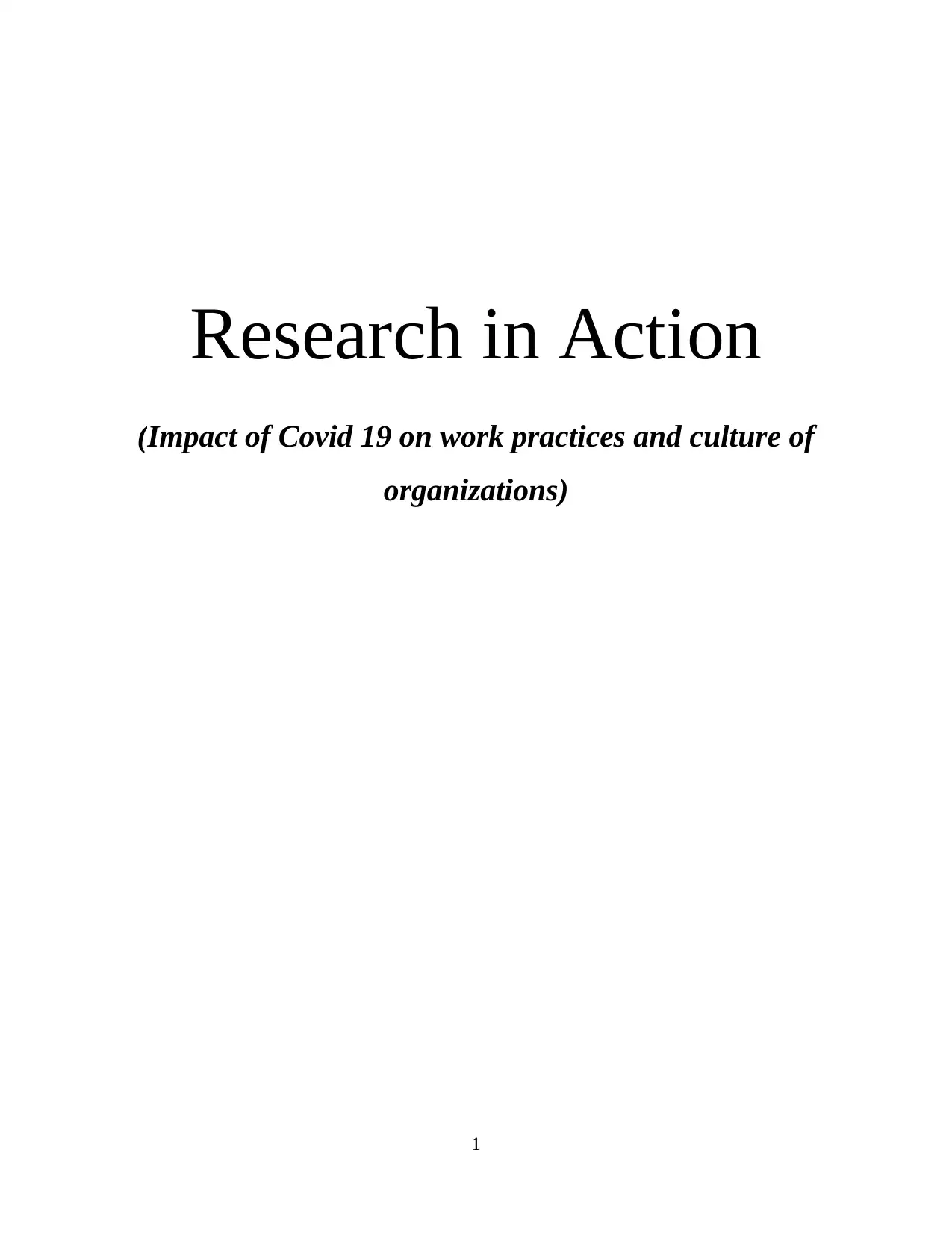
Research in Action
(Impact of Covid 19 on work practices and culture of
organizations)
1
(Impact of Covid 19 on work practices and culture of
organizations)
1
Paraphrase This Document
Need a fresh take? Get an instant paraphrase of this document with our AI Paraphraser
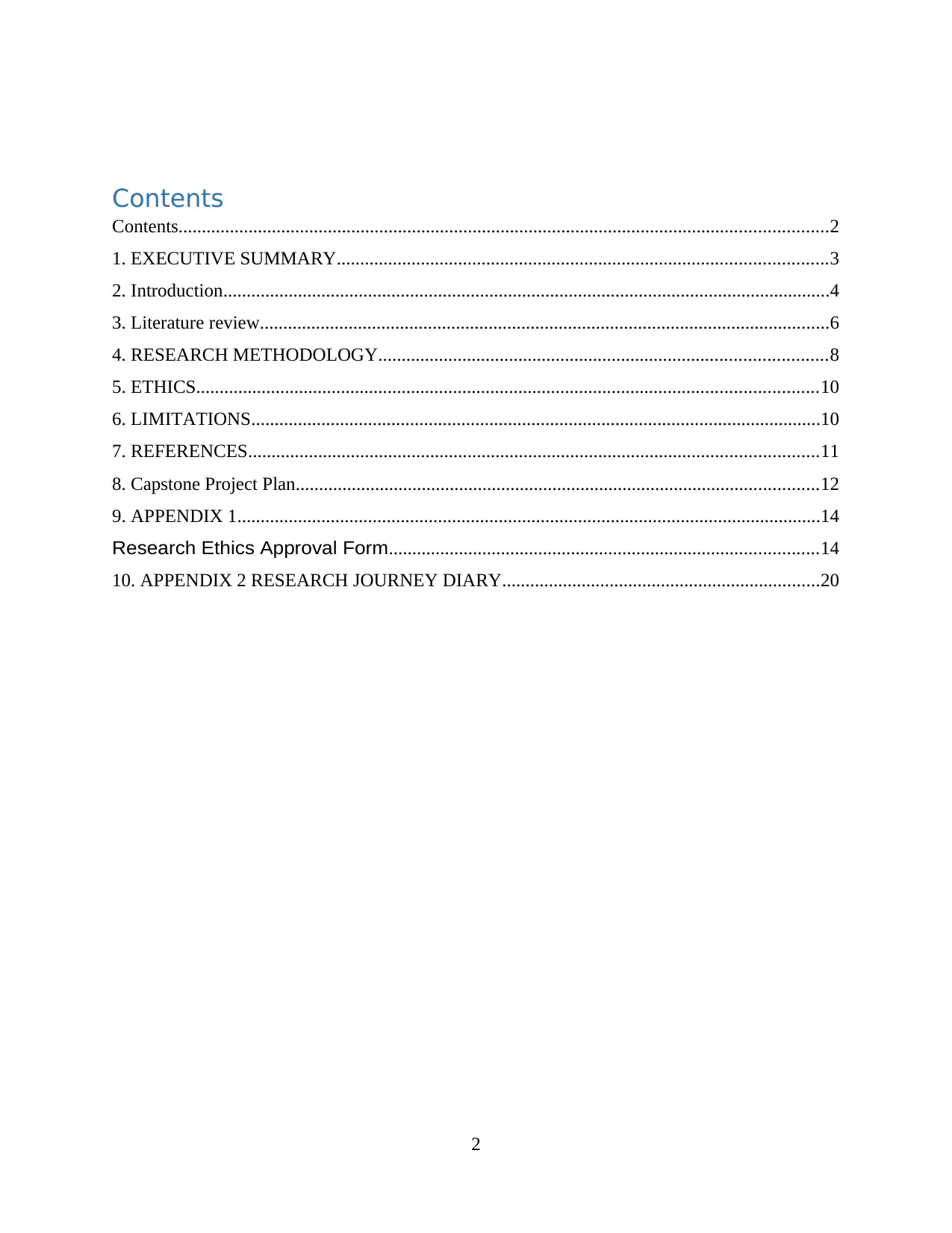
Contents
Contents...........................................................................................................................................2
1. EXECUTIVE SUMMARY.........................................................................................................3
2. Introduction..................................................................................................................................4
3. Literature review..........................................................................................................................6
4. RESEARCH METHODOLOGY................................................................................................8
5. ETHICS.....................................................................................................................................10
6. LIMITATIONS..........................................................................................................................10
7. REFERENCES..........................................................................................................................11
8. Capstone Project Plan................................................................................................................12
9. APPENDIX 1.............................................................................................................................14
Research Ethics Approval Form............................................................................................14
10. APPENDIX 2 RESEARCH JOURNEY DIARY....................................................................20
2
Contents...........................................................................................................................................2
1. EXECUTIVE SUMMARY.........................................................................................................3
2. Introduction..................................................................................................................................4
3. Literature review..........................................................................................................................6
4. RESEARCH METHODOLOGY................................................................................................8
5. ETHICS.....................................................................................................................................10
6. LIMITATIONS..........................................................................................................................10
7. REFERENCES..........................................................................................................................11
8. Capstone Project Plan................................................................................................................12
9. APPENDIX 1.............................................................................................................................14
Research Ethics Approval Form............................................................................................14
10. APPENDIX 2 RESEARCH JOURNEY DIARY....................................................................20
2
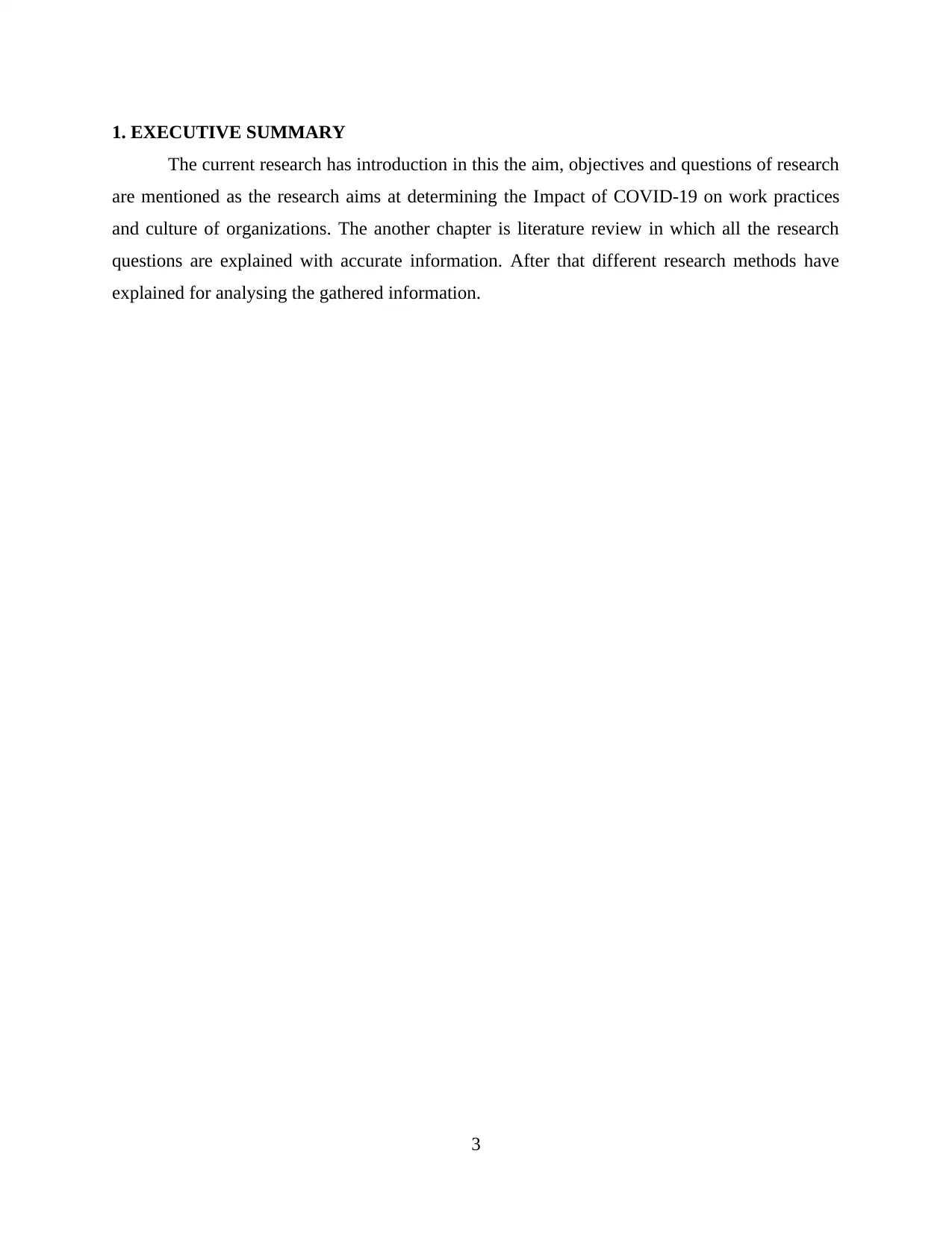
1. EXECUTIVE SUMMARY
The current research has introduction in this the aim, objectives and questions of research
are mentioned as the research aims at determining the Impact of COVID-19 on work practices
and culture of organizations. The another chapter is literature review in which all the research
questions are explained with accurate information. After that different research methods have
explained for analysing the gathered information.
3
The current research has introduction in this the aim, objectives and questions of research
are mentioned as the research aims at determining the Impact of COVID-19 on work practices
and culture of organizations. The another chapter is literature review in which all the research
questions are explained with accurate information. After that different research methods have
explained for analysing the gathered information.
3
You're viewing a preview
Unlock full access by subscribing today!
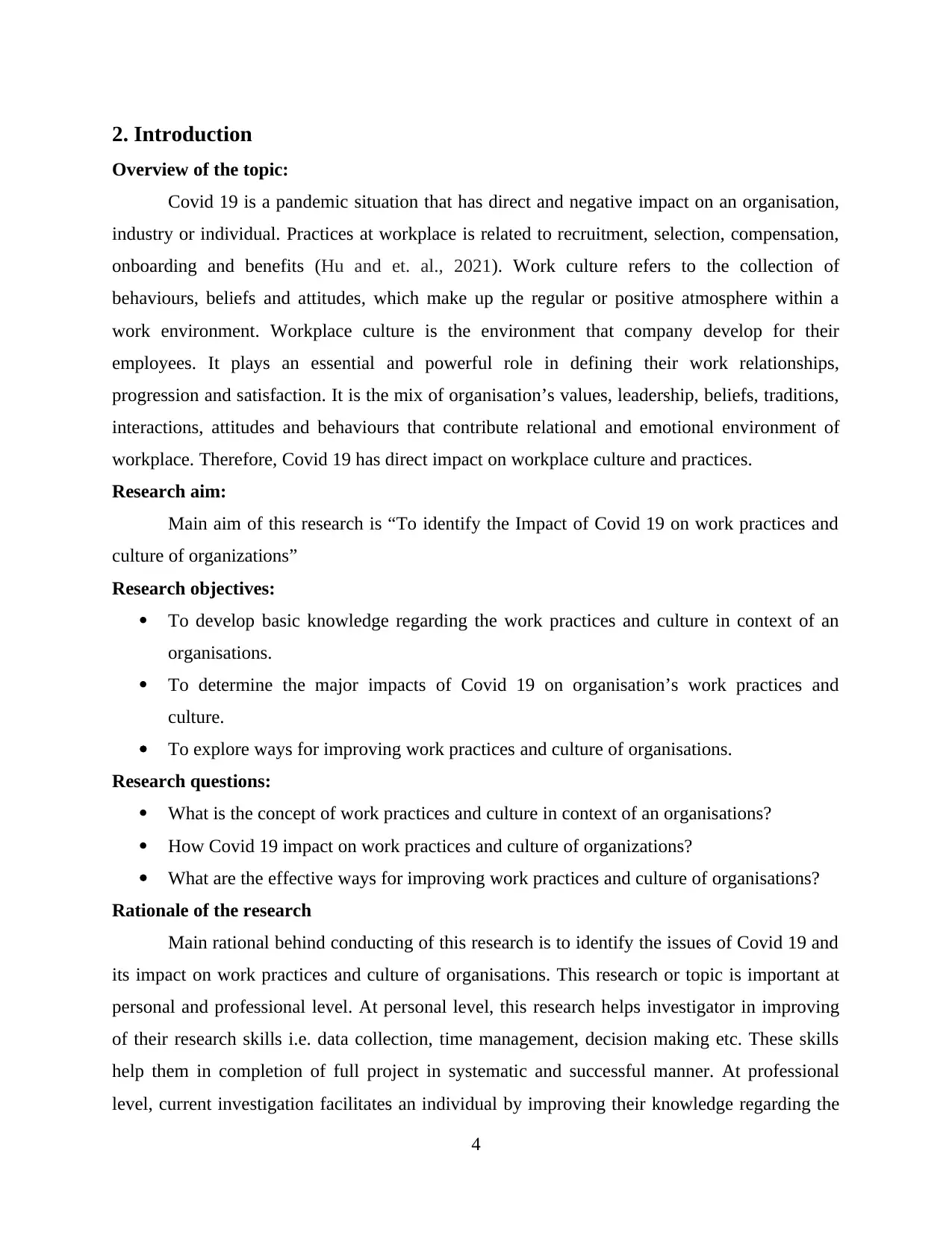
2. Introduction
Overview of the topic:
Covid 19 is a pandemic situation that has direct and negative impact on an organisation,
industry or individual. Practices at workplace is related to recruitment, selection, compensation,
onboarding and benefits (Hu and et. al., 2021). Work culture refers to the collection of
behaviours, beliefs and attitudes, which make up the regular or positive atmosphere within a
work environment. Workplace culture is the environment that company develop for their
employees. It plays an essential and powerful role in defining their work relationships,
progression and satisfaction. It is the mix of organisation’s values, leadership, beliefs, traditions,
interactions, attitudes and behaviours that contribute relational and emotional environment of
workplace. Therefore, Covid 19 has direct impact on workplace culture and practices.
Research aim:
Main aim of this research is “To identify the Impact of Covid 19 on work practices and
culture of organizations”
Research objectives:
To develop basic knowledge regarding the work practices and culture in context of an
organisations.
To determine the major impacts of Covid 19 on organisation’s work practices and
culture.
To explore ways for improving work practices and culture of organisations.
Research questions:
What is the concept of work practices and culture in context of an organisations?
How Covid 19 impact on work practices and culture of organizations?
What are the effective ways for improving work practices and culture of organisations?
Rationale of the research
Main rational behind conducting of this research is to identify the issues of Covid 19 and
its impact on work practices and culture of organisations. This research or topic is important at
personal and professional level. At personal level, this research helps investigator in improving
of their research skills i.e. data collection, time management, decision making etc. These skills
help them in completion of full project in systematic and successful manner. At professional
level, current investigation facilitates an individual by improving their knowledge regarding the
4
Overview of the topic:
Covid 19 is a pandemic situation that has direct and negative impact on an organisation,
industry or individual. Practices at workplace is related to recruitment, selection, compensation,
onboarding and benefits (Hu and et. al., 2021). Work culture refers to the collection of
behaviours, beliefs and attitudes, which make up the regular or positive atmosphere within a
work environment. Workplace culture is the environment that company develop for their
employees. It plays an essential and powerful role in defining their work relationships,
progression and satisfaction. It is the mix of organisation’s values, leadership, beliefs, traditions,
interactions, attitudes and behaviours that contribute relational and emotional environment of
workplace. Therefore, Covid 19 has direct impact on workplace culture and practices.
Research aim:
Main aim of this research is “To identify the Impact of Covid 19 on work practices and
culture of organizations”
Research objectives:
To develop basic knowledge regarding the work practices and culture in context of an
organisations.
To determine the major impacts of Covid 19 on organisation’s work practices and
culture.
To explore ways for improving work practices and culture of organisations.
Research questions:
What is the concept of work practices and culture in context of an organisations?
How Covid 19 impact on work practices and culture of organizations?
What are the effective ways for improving work practices and culture of organisations?
Rationale of the research
Main rational behind conducting of this research is to identify the issues of Covid 19 and
its impact on work practices and culture of organisations. This research or topic is important at
personal and professional level. At personal level, this research helps investigator in improving
of their research skills i.e. data collection, time management, decision making etc. These skills
help them in completion of full project in systematic and successful manner. At professional
level, current investigation facilitates an individual by improving their knowledge regarding the
4
Paraphrase This Document
Need a fresh take? Get an instant paraphrase of this document with our AI Paraphraser
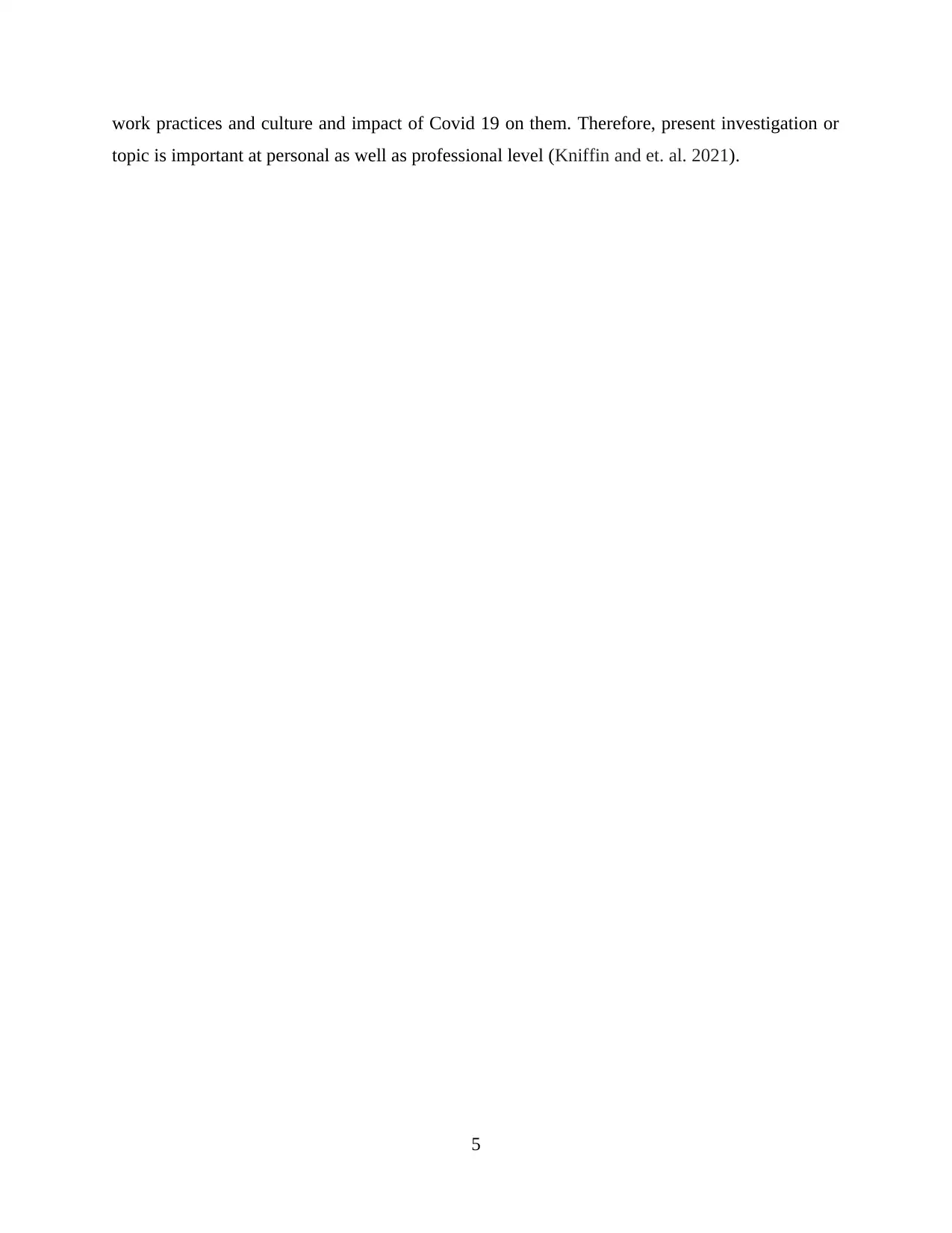
work practices and culture and impact of Covid 19 on them. Therefore, present investigation or
topic is important at personal as well as professional level (Kniffin and et. al. 2021).
5
topic is important at personal as well as professional level (Kniffin and et. al. 2021).
5
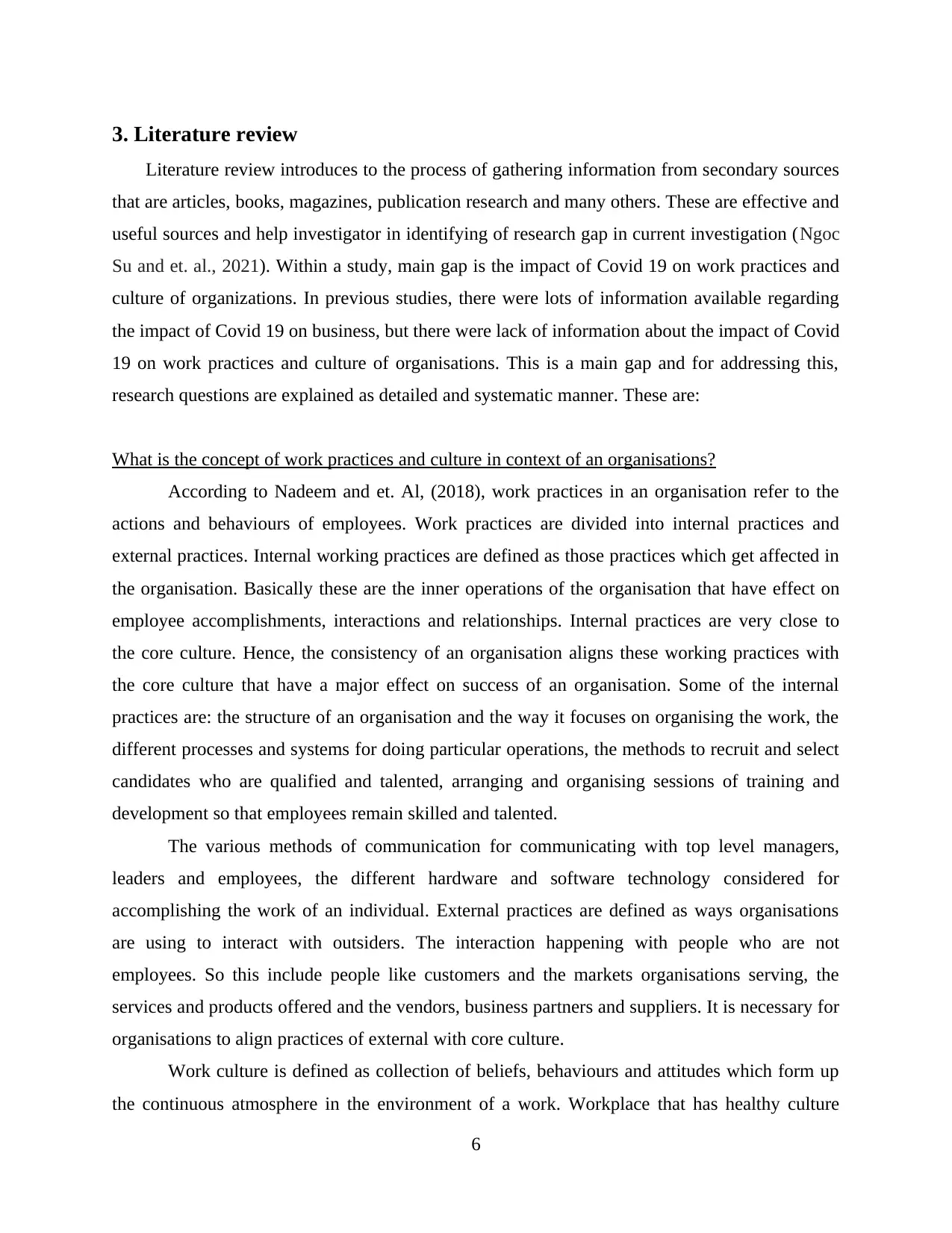
3. Literature review
Literature review introduces to the process of gathering information from secondary sources
that are articles, books, magazines, publication research and many others. These are effective and
useful sources and help investigator in identifying of research gap in current investigation (Ngoc
Su and et. al., 2021). Within a study, main gap is the impact of Covid 19 on work practices and
culture of organizations. In previous studies, there were lots of information available regarding
the impact of Covid 19 on business, but there were lack of information about the impact of Covid
19 on work practices and culture of organisations. This is a main gap and for addressing this,
research questions are explained as detailed and systematic manner. These are:
What is the concept of work practices and culture in context of an organisations?
According to Nadeem and et. Al, (2018), work practices in an organisation refer to the
actions and behaviours of employees. Work practices are divided into internal practices and
external practices. Internal working practices are defined as those practices which get affected in
the organisation. Basically these are the inner operations of the organisation that have effect on
employee accomplishments, interactions and relationships. Internal practices are very close to
the core culture. Hence, the consistency of an organisation aligns these working practices with
the core culture that have a major effect on success of an organisation. Some of the internal
practices are: the structure of an organisation and the way it focuses on organising the work, the
different processes and systems for doing particular operations, the methods to recruit and select
candidates who are qualified and talented, arranging and organising sessions of training and
development so that employees remain skilled and talented.
The various methods of communication for communicating with top level managers,
leaders and employees, the different hardware and software technology considered for
accomplishing the work of an individual. External practices are defined as ways organisations
are using to interact with outsiders. The interaction happening with people who are not
employees. So this include people like customers and the markets organisations serving, the
services and products offered and the vendors, business partners and suppliers. It is necessary for
organisations to align practices of external with core culture.
Work culture is defined as collection of beliefs, behaviours and attitudes which form up
the continuous atmosphere in the environment of a work. Workplace that has healthy culture
6
Literature review introduces to the process of gathering information from secondary sources
that are articles, books, magazines, publication research and many others. These are effective and
useful sources and help investigator in identifying of research gap in current investigation (Ngoc
Su and et. al., 2021). Within a study, main gap is the impact of Covid 19 on work practices and
culture of organizations. In previous studies, there were lots of information available regarding
the impact of Covid 19 on business, but there were lack of information about the impact of Covid
19 on work practices and culture of organisations. This is a main gap and for addressing this,
research questions are explained as detailed and systematic manner. These are:
What is the concept of work practices and culture in context of an organisations?
According to Nadeem and et. Al, (2018), work practices in an organisation refer to the
actions and behaviours of employees. Work practices are divided into internal practices and
external practices. Internal working practices are defined as those practices which get affected in
the organisation. Basically these are the inner operations of the organisation that have effect on
employee accomplishments, interactions and relationships. Internal practices are very close to
the core culture. Hence, the consistency of an organisation aligns these working practices with
the core culture that have a major effect on success of an organisation. Some of the internal
practices are: the structure of an organisation and the way it focuses on organising the work, the
different processes and systems for doing particular operations, the methods to recruit and select
candidates who are qualified and talented, arranging and organising sessions of training and
development so that employees remain skilled and talented.
The various methods of communication for communicating with top level managers,
leaders and employees, the different hardware and software technology considered for
accomplishing the work of an individual. External practices are defined as ways organisations
are using to interact with outsiders. The interaction happening with people who are not
employees. So this include people like customers and the markets organisations serving, the
services and products offered and the vendors, business partners and suppliers. It is necessary for
organisations to align practices of external with core culture.
Work culture is defined as collection of beliefs, behaviours and attitudes which form up
the continuous atmosphere in the environment of a work. Workplace that has healthy culture
6
You're viewing a preview
Unlock full access by subscribing today!
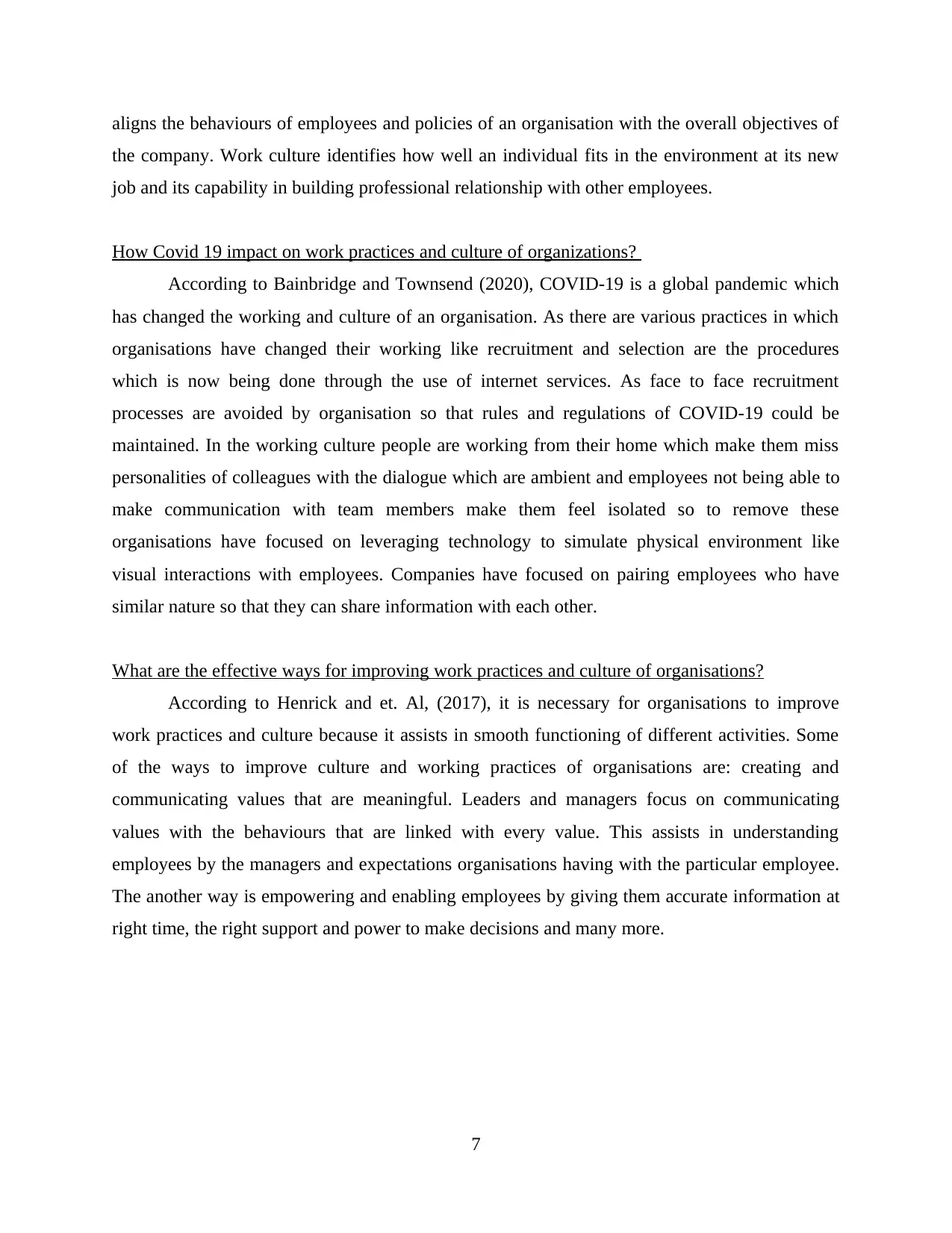
aligns the behaviours of employees and policies of an organisation with the overall objectives of
the company. Work culture identifies how well an individual fits in the environment at its new
job and its capability in building professional relationship with other employees.
How Covid 19 impact on work practices and culture of organizations?
According to Bainbridge and Townsend (2020), COVID-19 is a global pandemic which
has changed the working and culture of an organisation. As there are various practices in which
organisations have changed their working like recruitment and selection are the procedures
which is now being done through the use of internet services. As face to face recruitment
processes are avoided by organisation so that rules and regulations of COVID-19 could be
maintained. In the working culture people are working from their home which make them miss
personalities of colleagues with the dialogue which are ambient and employees not being able to
make communication with team members make them feel isolated so to remove these
organisations have focused on leveraging technology to simulate physical environment like
visual interactions with employees. Companies have focused on pairing employees who have
similar nature so that they can share information with each other.
What are the effective ways for improving work practices and culture of organisations?
According to Henrick and et. Al, (2017), it is necessary for organisations to improve
work practices and culture because it assists in smooth functioning of different activities. Some
of the ways to improve culture and working practices of organisations are: creating and
communicating values that are meaningful. Leaders and managers focus on communicating
values with the behaviours that are linked with every value. This assists in understanding
employees by the managers and expectations organisations having with the particular employee.
The another way is empowering and enabling employees by giving them accurate information at
right time, the right support and power to make decisions and many more.
7
the company. Work culture identifies how well an individual fits in the environment at its new
job and its capability in building professional relationship with other employees.
How Covid 19 impact on work practices and culture of organizations?
According to Bainbridge and Townsend (2020), COVID-19 is a global pandemic which
has changed the working and culture of an organisation. As there are various practices in which
organisations have changed their working like recruitment and selection are the procedures
which is now being done through the use of internet services. As face to face recruitment
processes are avoided by organisation so that rules and regulations of COVID-19 could be
maintained. In the working culture people are working from their home which make them miss
personalities of colleagues with the dialogue which are ambient and employees not being able to
make communication with team members make them feel isolated so to remove these
organisations have focused on leveraging technology to simulate physical environment like
visual interactions with employees. Companies have focused on pairing employees who have
similar nature so that they can share information with each other.
What are the effective ways for improving work practices and culture of organisations?
According to Henrick and et. Al, (2017), it is necessary for organisations to improve
work practices and culture because it assists in smooth functioning of different activities. Some
of the ways to improve culture and working practices of organisations are: creating and
communicating values that are meaningful. Leaders and managers focus on communicating
values with the behaviours that are linked with every value. This assists in understanding
employees by the managers and expectations organisations having with the particular employee.
The another way is empowering and enabling employees by giving them accurate information at
right time, the right support and power to make decisions and many more.
7
Paraphrase This Document
Need a fresh take? Get an instant paraphrase of this document with our AI Paraphraser
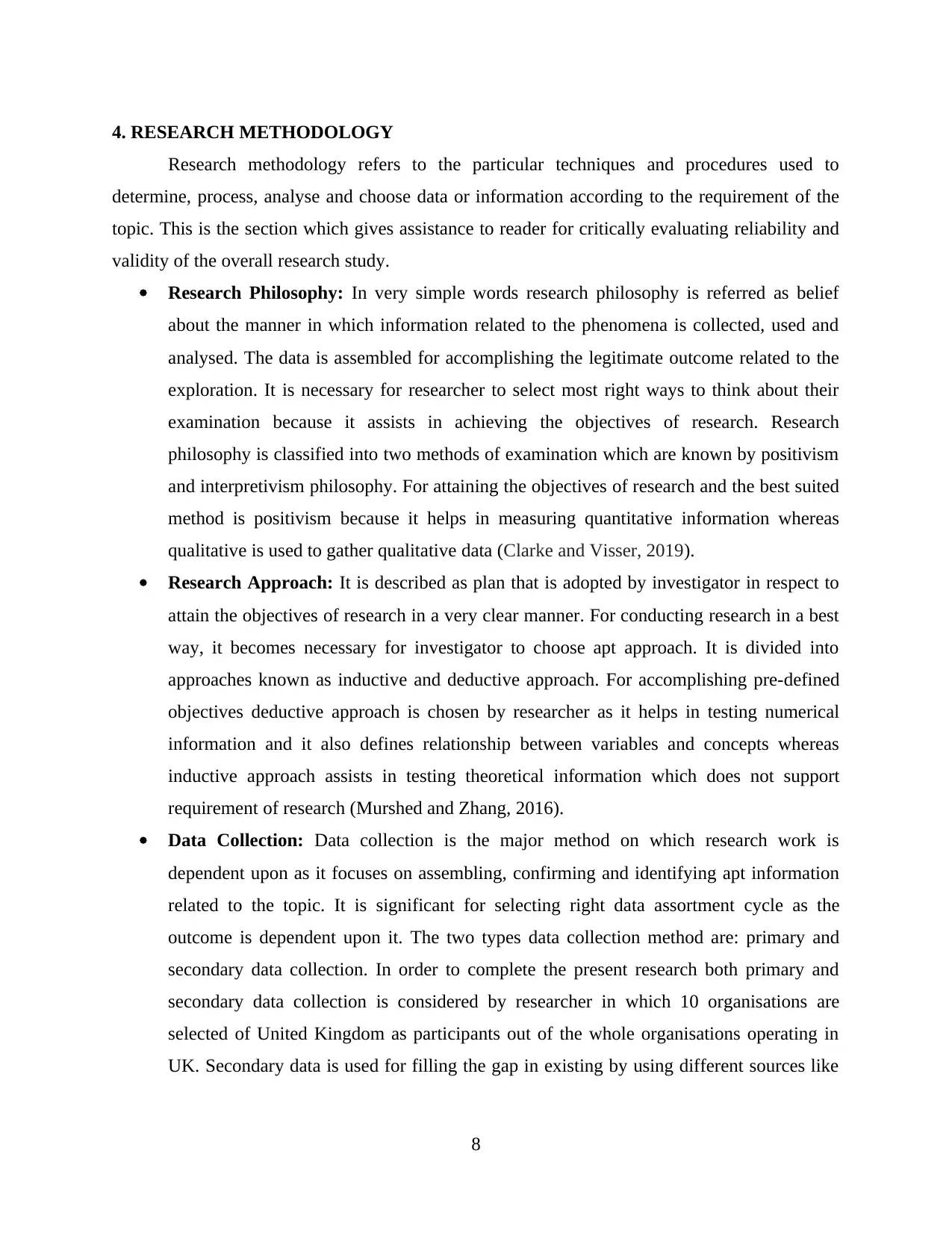
4. RESEARCH METHODOLOGY
Research methodology refers to the particular techniques and procedures used to
determine, process, analyse and choose data or information according to the requirement of the
topic. This is the section which gives assistance to reader for critically evaluating reliability and
validity of the overall research study.
Research Philosophy: In very simple words research philosophy is referred as belief
about the manner in which information related to the phenomena is collected, used and
analysed. The data is assembled for accomplishing the legitimate outcome related to the
exploration. It is necessary for researcher to select most right ways to think about their
examination because it assists in achieving the objectives of research. Research
philosophy is classified into two methods of examination which are known by positivism
and interpretivism philosophy. For attaining the objectives of research and the best suited
method is positivism because it helps in measuring quantitative information whereas
qualitative is used to gather qualitative data (Clarke and Visser, 2019).
Research Approach: It is described as plan that is adopted by investigator in respect to
attain the objectives of research in a very clear manner. For conducting research in a best
way, it becomes necessary for investigator to choose apt approach. It is divided into
approaches known as inductive and deductive approach. For accomplishing pre-defined
objectives deductive approach is chosen by researcher as it helps in testing numerical
information and it also defines relationship between variables and concepts whereas
inductive approach assists in testing theoretical information which does not support
requirement of research (Murshed and Zhang, 2016).
Data Collection: Data collection is the major method on which research work is
dependent upon as it focuses on assembling, confirming and identifying apt information
related to the topic. It is significant for selecting right data assortment cycle as the
outcome is dependent upon it. The two types data collection method are: primary and
secondary data collection. In order to complete the present research both primary and
secondary data collection is considered by researcher in which 10 organisations are
selected of United Kingdom as participants out of the whole organisations operating in
UK. Secondary data is used for filling the gap in existing by using different sources like
8
Research methodology refers to the particular techniques and procedures used to
determine, process, analyse and choose data or information according to the requirement of the
topic. This is the section which gives assistance to reader for critically evaluating reliability and
validity of the overall research study.
Research Philosophy: In very simple words research philosophy is referred as belief
about the manner in which information related to the phenomena is collected, used and
analysed. The data is assembled for accomplishing the legitimate outcome related to the
exploration. It is necessary for researcher to select most right ways to think about their
examination because it assists in achieving the objectives of research. Research
philosophy is classified into two methods of examination which are known by positivism
and interpretivism philosophy. For attaining the objectives of research and the best suited
method is positivism because it helps in measuring quantitative information whereas
qualitative is used to gather qualitative data (Clarke and Visser, 2019).
Research Approach: It is described as plan that is adopted by investigator in respect to
attain the objectives of research in a very clear manner. For conducting research in a best
way, it becomes necessary for investigator to choose apt approach. It is divided into
approaches known as inductive and deductive approach. For accomplishing pre-defined
objectives deductive approach is chosen by researcher as it helps in testing numerical
information and it also defines relationship between variables and concepts whereas
inductive approach assists in testing theoretical information which does not support
requirement of research (Murshed and Zhang, 2016).
Data Collection: Data collection is the major method on which research work is
dependent upon as it focuses on assembling, confirming and identifying apt information
related to the topic. It is significant for selecting right data assortment cycle as the
outcome is dependent upon it. The two types data collection method are: primary and
secondary data collection. In order to complete the present research both primary and
secondary data collection is considered by researcher in which 10 organisations are
selected of United Kingdom as participants out of the whole organisations operating in
UK. Secondary data is used for filling the gap in existing by using different sources like
8
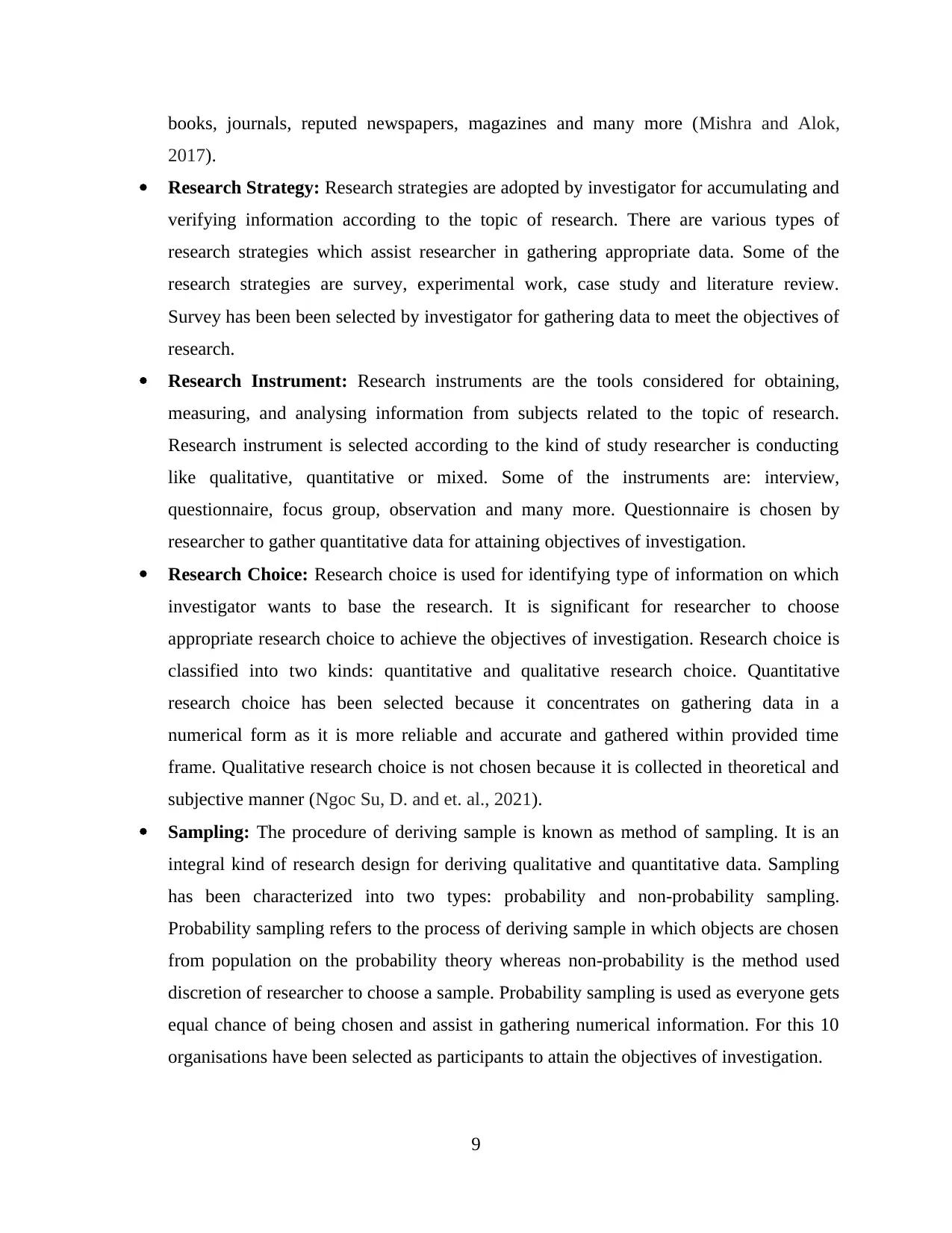
books, journals, reputed newspapers, magazines and many more (Mishra and Alok,
2017).
Research Strategy: Research strategies are adopted by investigator for accumulating and
verifying information according to the topic of research. There are various types of
research strategies which assist researcher in gathering appropriate data. Some of the
research strategies are survey, experimental work, case study and literature review.
Survey has been been selected by investigator for gathering data to meet the objectives of
research.
Research Instrument: Research instruments are the tools considered for obtaining,
measuring, and analysing information from subjects related to the topic of research.
Research instrument is selected according to the kind of study researcher is conducting
like qualitative, quantitative or mixed. Some of the instruments are: interview,
questionnaire, focus group, observation and many more. Questionnaire is chosen by
researcher to gather quantitative data for attaining objectives of investigation.
Research Choice: Research choice is used for identifying type of information on which
investigator wants to base the research. It is significant for researcher to choose
appropriate research choice to achieve the objectives of investigation. Research choice is
classified into two kinds: quantitative and qualitative research choice. Quantitative
research choice has been selected because it concentrates on gathering data in a
numerical form as it is more reliable and accurate and gathered within provided time
frame. Qualitative research choice is not chosen because it is collected in theoretical and
subjective manner (Ngoc Su, D. and et. al., 2021).
Sampling: The procedure of deriving sample is known as method of sampling. It is an
integral kind of research design for deriving qualitative and quantitative data. Sampling
has been characterized into two types: probability and non-probability sampling.
Probability sampling refers to the process of deriving sample in which objects are chosen
from population on the probability theory whereas non-probability is the method used
discretion of researcher to choose a sample. Probability sampling is used as everyone gets
equal chance of being chosen and assist in gathering numerical information. For this 10
organisations have been selected as participants to attain the objectives of investigation.
9
2017).
Research Strategy: Research strategies are adopted by investigator for accumulating and
verifying information according to the topic of research. There are various types of
research strategies which assist researcher in gathering appropriate data. Some of the
research strategies are survey, experimental work, case study and literature review.
Survey has been been selected by investigator for gathering data to meet the objectives of
research.
Research Instrument: Research instruments are the tools considered for obtaining,
measuring, and analysing information from subjects related to the topic of research.
Research instrument is selected according to the kind of study researcher is conducting
like qualitative, quantitative or mixed. Some of the instruments are: interview,
questionnaire, focus group, observation and many more. Questionnaire is chosen by
researcher to gather quantitative data for attaining objectives of investigation.
Research Choice: Research choice is used for identifying type of information on which
investigator wants to base the research. It is significant for researcher to choose
appropriate research choice to achieve the objectives of investigation. Research choice is
classified into two kinds: quantitative and qualitative research choice. Quantitative
research choice has been selected because it concentrates on gathering data in a
numerical form as it is more reliable and accurate and gathered within provided time
frame. Qualitative research choice is not chosen because it is collected in theoretical and
subjective manner (Ngoc Su, D. and et. al., 2021).
Sampling: The procedure of deriving sample is known as method of sampling. It is an
integral kind of research design for deriving qualitative and quantitative data. Sampling
has been characterized into two types: probability and non-probability sampling.
Probability sampling refers to the process of deriving sample in which objects are chosen
from population on the probability theory whereas non-probability is the method used
discretion of researcher to choose a sample. Probability sampling is used as everyone gets
equal chance of being chosen and assist in gathering numerical information. For this 10
organisations have been selected as participants to attain the objectives of investigation.
9
You're viewing a preview
Unlock full access by subscribing today!
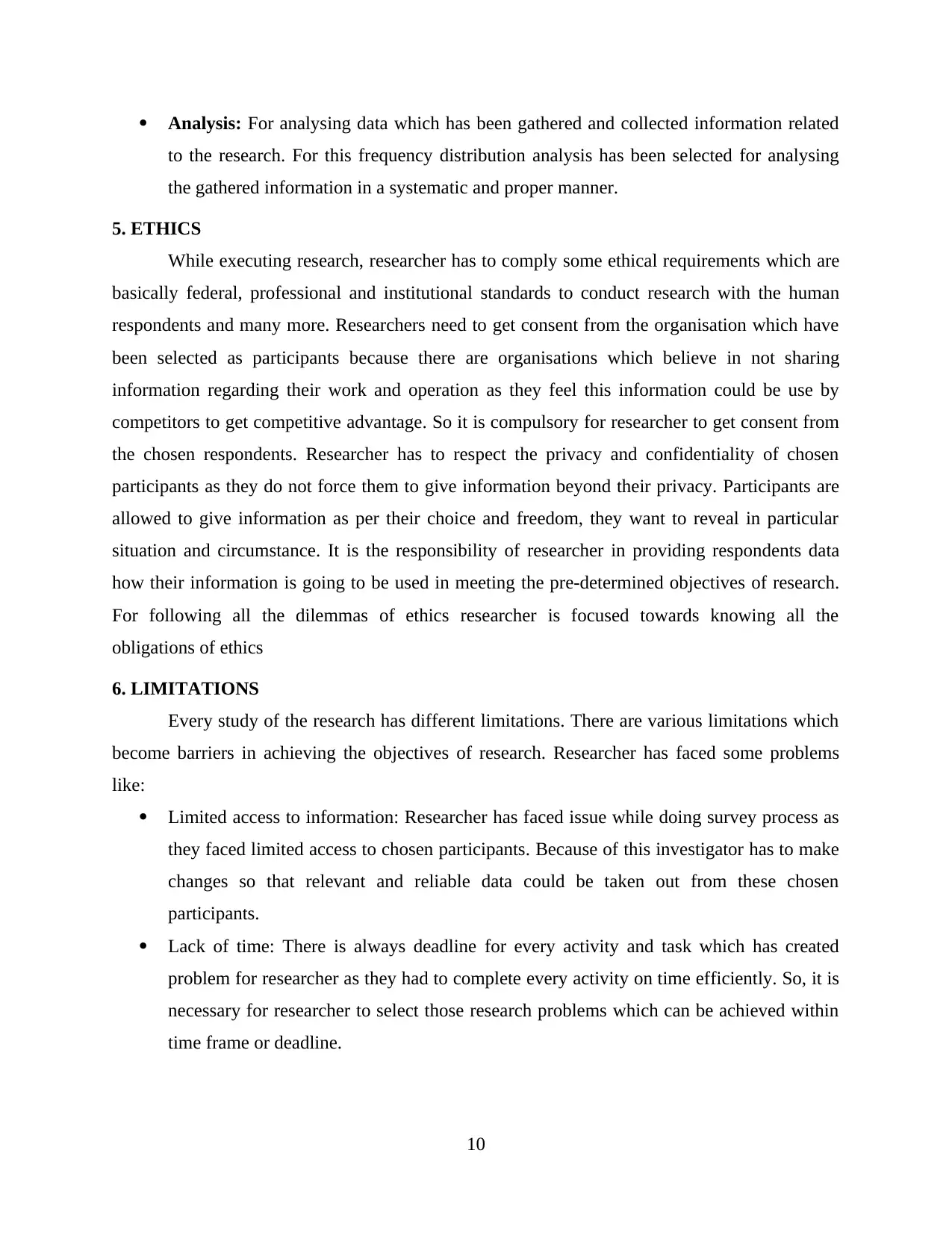
Analysis: For analysing data which has been gathered and collected information related
to the research. For this frequency distribution analysis has been selected for analysing
the gathered information in a systematic and proper manner.
5. ETHICS
While executing research, researcher has to comply some ethical requirements which are
basically federal, professional and institutional standards to conduct research with the human
respondents and many more. Researchers need to get consent from the organisation which have
been selected as participants because there are organisations which believe in not sharing
information regarding their work and operation as they feel this information could be use by
competitors to get competitive advantage. So it is compulsory for researcher to get consent from
the chosen respondents. Researcher has to respect the privacy and confidentiality of chosen
participants as they do not force them to give information beyond their privacy. Participants are
allowed to give information as per their choice and freedom, they want to reveal in particular
situation and circumstance. It is the responsibility of researcher in providing respondents data
how their information is going to be used in meeting the pre-determined objectives of research.
For following all the dilemmas of ethics researcher is focused towards knowing all the
obligations of ethics
6. LIMITATIONS
Every study of the research has different limitations. There are various limitations which
become barriers in achieving the objectives of research. Researcher has faced some problems
like:
Limited access to information: Researcher has faced issue while doing survey process as
they faced limited access to chosen participants. Because of this investigator has to make
changes so that relevant and reliable data could be taken out from these chosen
participants.
Lack of time: There is always deadline for every activity and task which has created
problem for researcher as they had to complete every activity on time efficiently. So, it is
necessary for researcher to select those research problems which can be achieved within
time frame or deadline.
10
to the research. For this frequency distribution analysis has been selected for analysing
the gathered information in a systematic and proper manner.
5. ETHICS
While executing research, researcher has to comply some ethical requirements which are
basically federal, professional and institutional standards to conduct research with the human
respondents and many more. Researchers need to get consent from the organisation which have
been selected as participants because there are organisations which believe in not sharing
information regarding their work and operation as they feel this information could be use by
competitors to get competitive advantage. So it is compulsory for researcher to get consent from
the chosen respondents. Researcher has to respect the privacy and confidentiality of chosen
participants as they do not force them to give information beyond their privacy. Participants are
allowed to give information as per their choice and freedom, they want to reveal in particular
situation and circumstance. It is the responsibility of researcher in providing respondents data
how their information is going to be used in meeting the pre-determined objectives of research.
For following all the dilemmas of ethics researcher is focused towards knowing all the
obligations of ethics
6. LIMITATIONS
Every study of the research has different limitations. There are various limitations which
become barriers in achieving the objectives of research. Researcher has faced some problems
like:
Limited access to information: Researcher has faced issue while doing survey process as
they faced limited access to chosen participants. Because of this investigator has to make
changes so that relevant and reliable data could be taken out from these chosen
participants.
Lack of time: There is always deadline for every activity and task which has created
problem for researcher as they had to complete every activity on time efficiently. So, it is
necessary for researcher to select those research problems which can be achieved within
time frame or deadline.
10
Paraphrase This Document
Need a fresh take? Get an instant paraphrase of this document with our AI Paraphraser
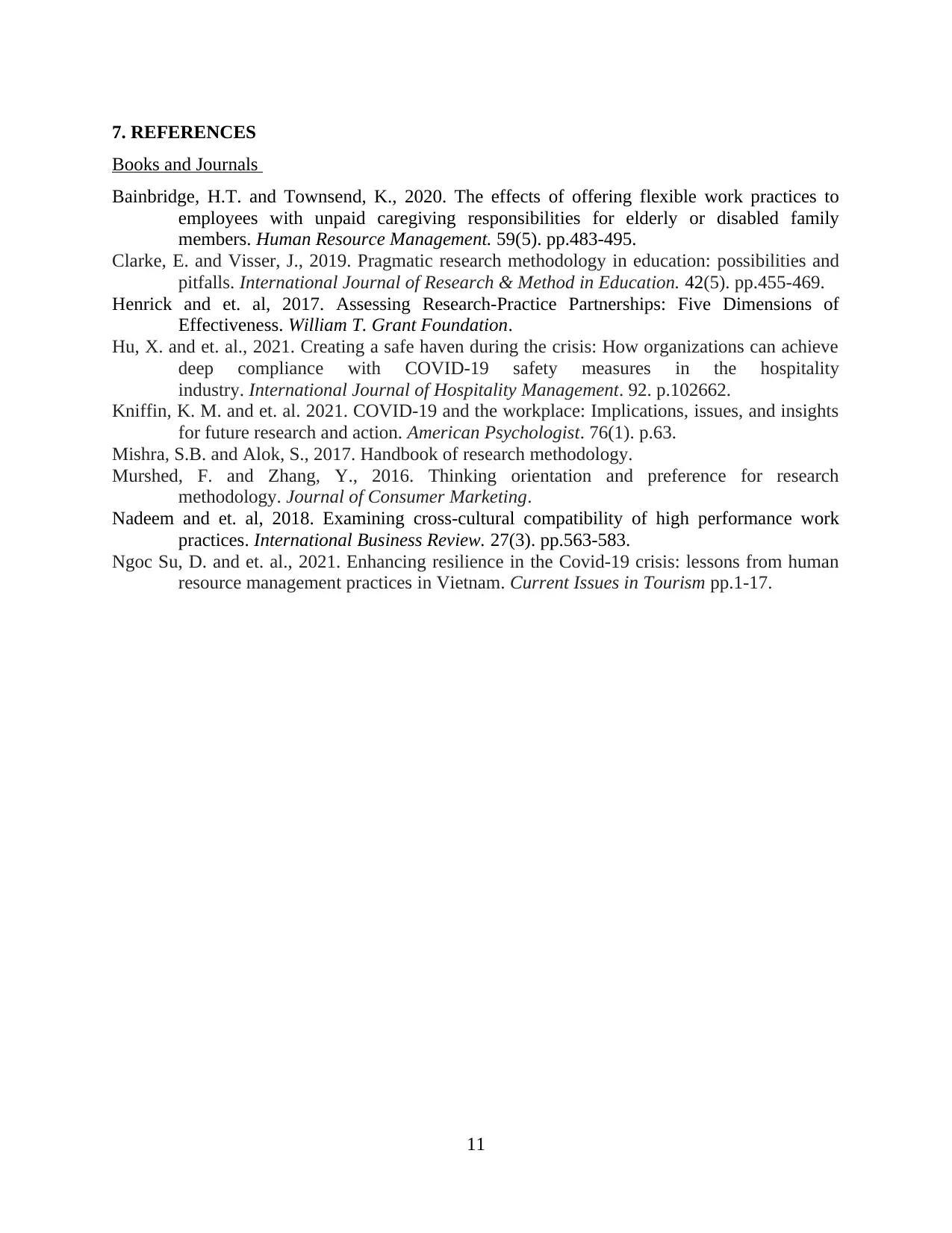
7. REFERENCES
Books and Journals
Bainbridge, H.T. and Townsend, K., 2020. The effects of offering flexible work practices to
employees with unpaid caregiving responsibilities for elderly or disabled family
members. Human Resource Management. 59(5). pp.483-495.
Clarke, E. and Visser, J., 2019. Pragmatic research methodology in education: possibilities and
pitfalls. International Journal of Research & Method in Education. 42(5). pp.455-469.
Henrick and et. al, 2017. Assessing Research-Practice Partnerships: Five Dimensions of
Effectiveness. William T. Grant Foundation.
Hu, X. and et. al., 2021. Creating a safe haven during the crisis: How organizations can achieve
deep compliance with COVID-19 safety measures in the hospitality
industry. International Journal of Hospitality Management. 92. p.102662.
Kniffin, K. M. and et. al. 2021. COVID-19 and the workplace: Implications, issues, and insights
for future research and action. American Psychologist. 76(1). p.63.
Mishra, S.B. and Alok, S., 2017. Handbook of research methodology.
Murshed, F. and Zhang, Y., 2016. Thinking orientation and preference for research
methodology. Journal of Consumer Marketing.
Nadeem and et. al, 2018. Examining cross-cultural compatibility of high performance work
practices. International Business Review. 27(3). pp.563-583.
Ngoc Su, D. and et. al., 2021. Enhancing resilience in the Covid-19 crisis: lessons from human
resource management practices in Vietnam. Current Issues in Tourism pp.1-17.
11
Books and Journals
Bainbridge, H.T. and Townsend, K., 2020. The effects of offering flexible work practices to
employees with unpaid caregiving responsibilities for elderly or disabled family
members. Human Resource Management. 59(5). pp.483-495.
Clarke, E. and Visser, J., 2019. Pragmatic research methodology in education: possibilities and
pitfalls. International Journal of Research & Method in Education. 42(5). pp.455-469.
Henrick and et. al, 2017. Assessing Research-Practice Partnerships: Five Dimensions of
Effectiveness. William T. Grant Foundation.
Hu, X. and et. al., 2021. Creating a safe haven during the crisis: How organizations can achieve
deep compliance with COVID-19 safety measures in the hospitality
industry. International Journal of Hospitality Management. 92. p.102662.
Kniffin, K. M. and et. al. 2021. COVID-19 and the workplace: Implications, issues, and insights
for future research and action. American Psychologist. 76(1). p.63.
Mishra, S.B. and Alok, S., 2017. Handbook of research methodology.
Murshed, F. and Zhang, Y., 2016. Thinking orientation and preference for research
methodology. Journal of Consumer Marketing.
Nadeem and et. al, 2018. Examining cross-cultural compatibility of high performance work
practices. International Business Review. 27(3). pp.563-583.
Ngoc Su, D. and et. al., 2021. Enhancing resilience in the Covid-19 crisis: lessons from human
resource management practices in Vietnam. Current Issues in Tourism pp.1-17.
11
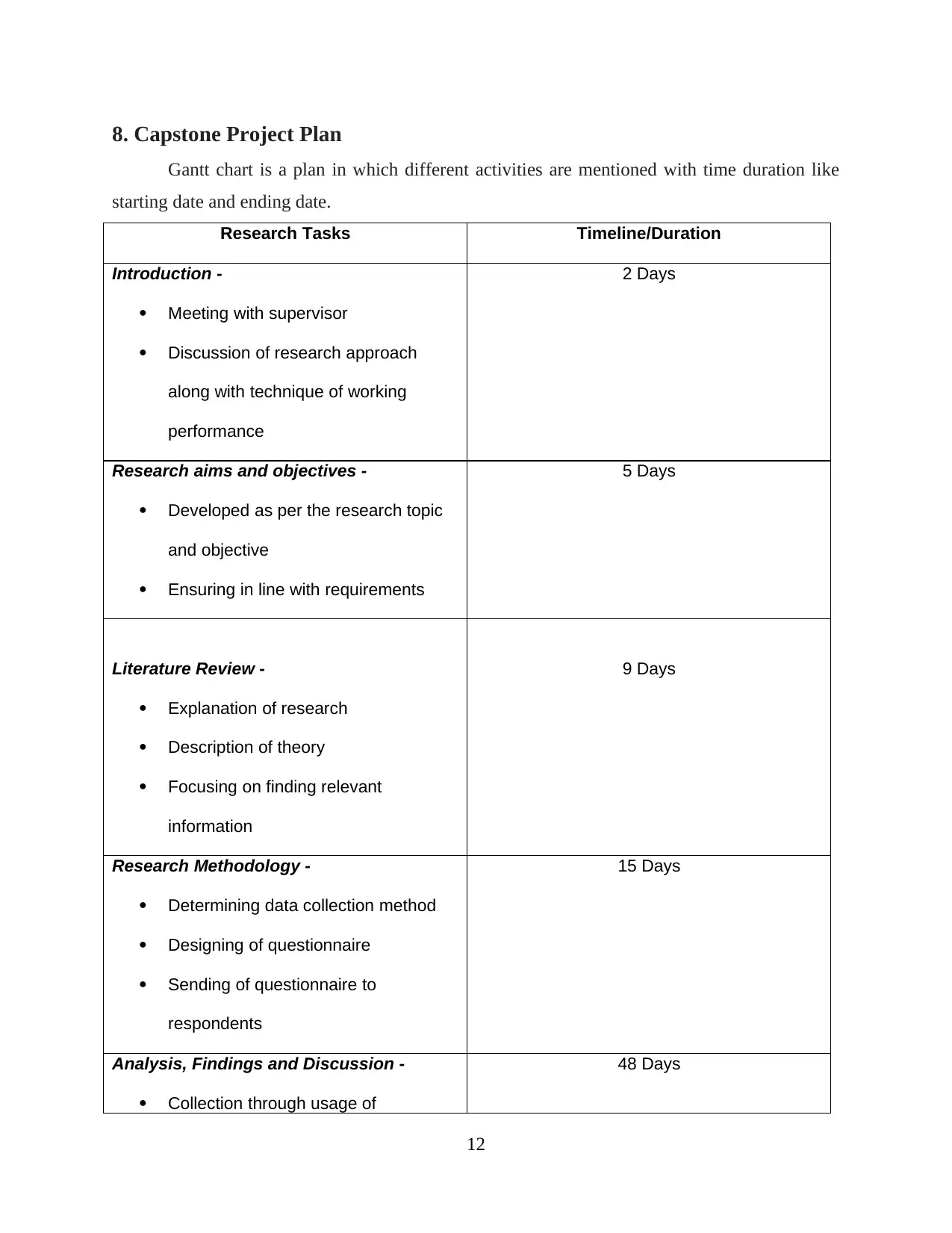
8. Capstone Project Plan
Gantt chart is a plan in which different activities are mentioned with time duration like
starting date and ending date.
Research Tasks Timeline/Duration
Introduction -
Meeting with supervisor
Discussion of research approach
along with technique of working
performance
2 Days
Research aims and objectives -
Developed as per the research topic
and objective
Ensuring in line with requirements
5 Days
Literature Review -
Explanation of research
Description of theory
Focusing on finding relevant
information
9 Days
Research Methodology -
Determining data collection method
Designing of questionnaire
Sending of questionnaire to
respondents
15 Days
Analysis, Findings and Discussion -
Collection through usage of
48 Days
12
Gantt chart is a plan in which different activities are mentioned with time duration like
starting date and ending date.
Research Tasks Timeline/Duration
Introduction -
Meeting with supervisor
Discussion of research approach
along with technique of working
performance
2 Days
Research aims and objectives -
Developed as per the research topic
and objective
Ensuring in line with requirements
5 Days
Literature Review -
Explanation of research
Description of theory
Focusing on finding relevant
information
9 Days
Research Methodology -
Determining data collection method
Designing of questionnaire
Sending of questionnaire to
respondents
15 Days
Analysis, Findings and Discussion -
Collection through usage of
48 Days
12
You're viewing a preview
Unlock full access by subscribing today!
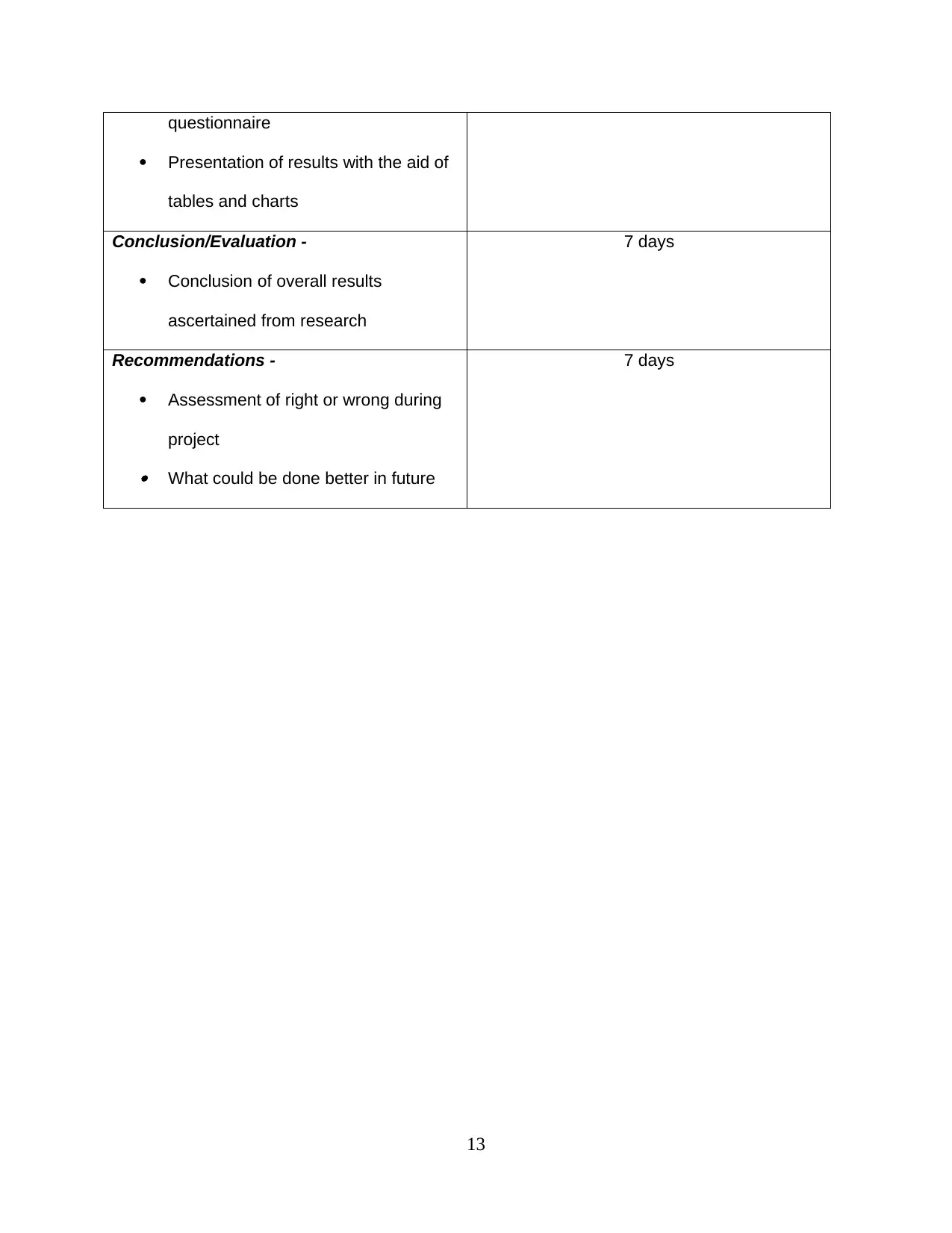
questionnaire
Presentation of results with the aid of
tables and charts
Conclusion/Evaluation -
Conclusion of overall results
ascertained from research
7 days
Recommendations -
Assessment of right or wrong during
project What could be done better in future
7 days
13
Presentation of results with the aid of
tables and charts
Conclusion/Evaluation -
Conclusion of overall results
ascertained from research
7 days
Recommendations -
Assessment of right or wrong during
project What could be done better in future
7 days
13
Paraphrase This Document
Need a fresh take? Get an instant paraphrase of this document with our AI Paraphraser
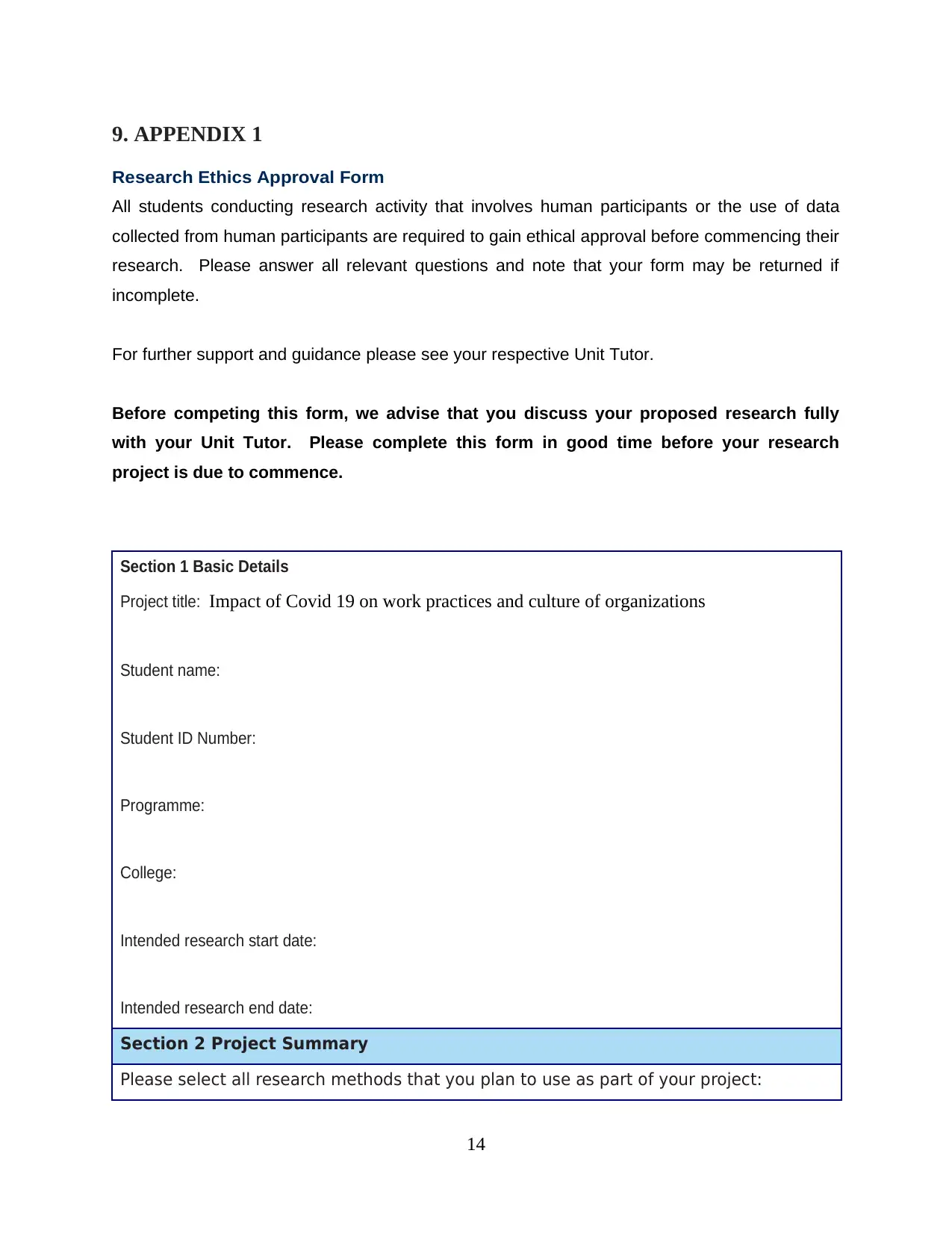
9. APPENDIX 1
Research Ethics Approval Form
All students conducting research activity that involves human participants or the use of data
collected from human participants are required to gain ethical approval before commencing their
research. Please answer all relevant questions and note that your form may be returned if
incomplete.
For further support and guidance please see your respective Unit Tutor.
Before competing this form, we advise that you discuss your proposed research fully
with your Unit Tutor. Please complete this form in good time before your research
project is due to commence.
Section 1 Basic Details
Project title: Impact of Covid 19 on work practices and culture of organizations
Student name:
Student ID Number:
Programme:
College:
Intended research start date:
Intended research end date:
Section 2 Project Summary
Please select all research methods that you plan to use as part of your project:
14
Research Ethics Approval Form
All students conducting research activity that involves human participants or the use of data
collected from human participants are required to gain ethical approval before commencing their
research. Please answer all relevant questions and note that your form may be returned if
incomplete.
For further support and guidance please see your respective Unit Tutor.
Before competing this form, we advise that you discuss your proposed research fully
with your Unit Tutor. Please complete this form in good time before your research
project is due to commence.
Section 1 Basic Details
Project title: Impact of Covid 19 on work practices and culture of organizations
Student name:
Student ID Number:
Programme:
College:
Intended research start date:
Intended research end date:
Section 2 Project Summary
Please select all research methods that you plan to use as part of your project:
14
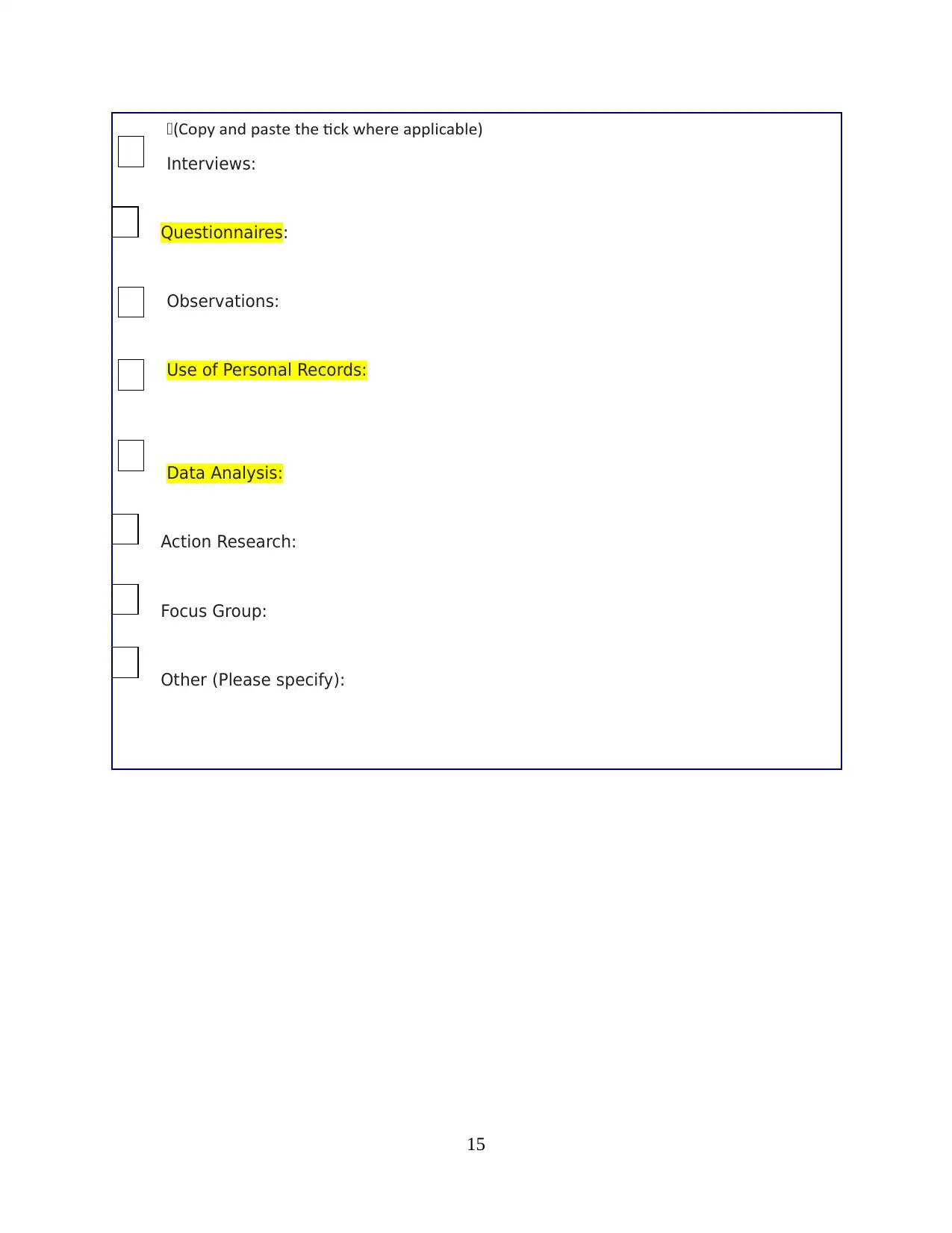
(Copy and paste the tick where applicable)
Interviews:
Questionnaires:
Observations:
Use of Personal Records:
Data Analysis:
Action Research:
Focus Group:
Other (Please specify):
15
Interviews:
Questionnaires:
Observations:
Use of Personal Records:
Data Analysis:
Action Research:
Focus Group:
Other (Please specify):
15
You're viewing a preview
Unlock full access by subscribing today!
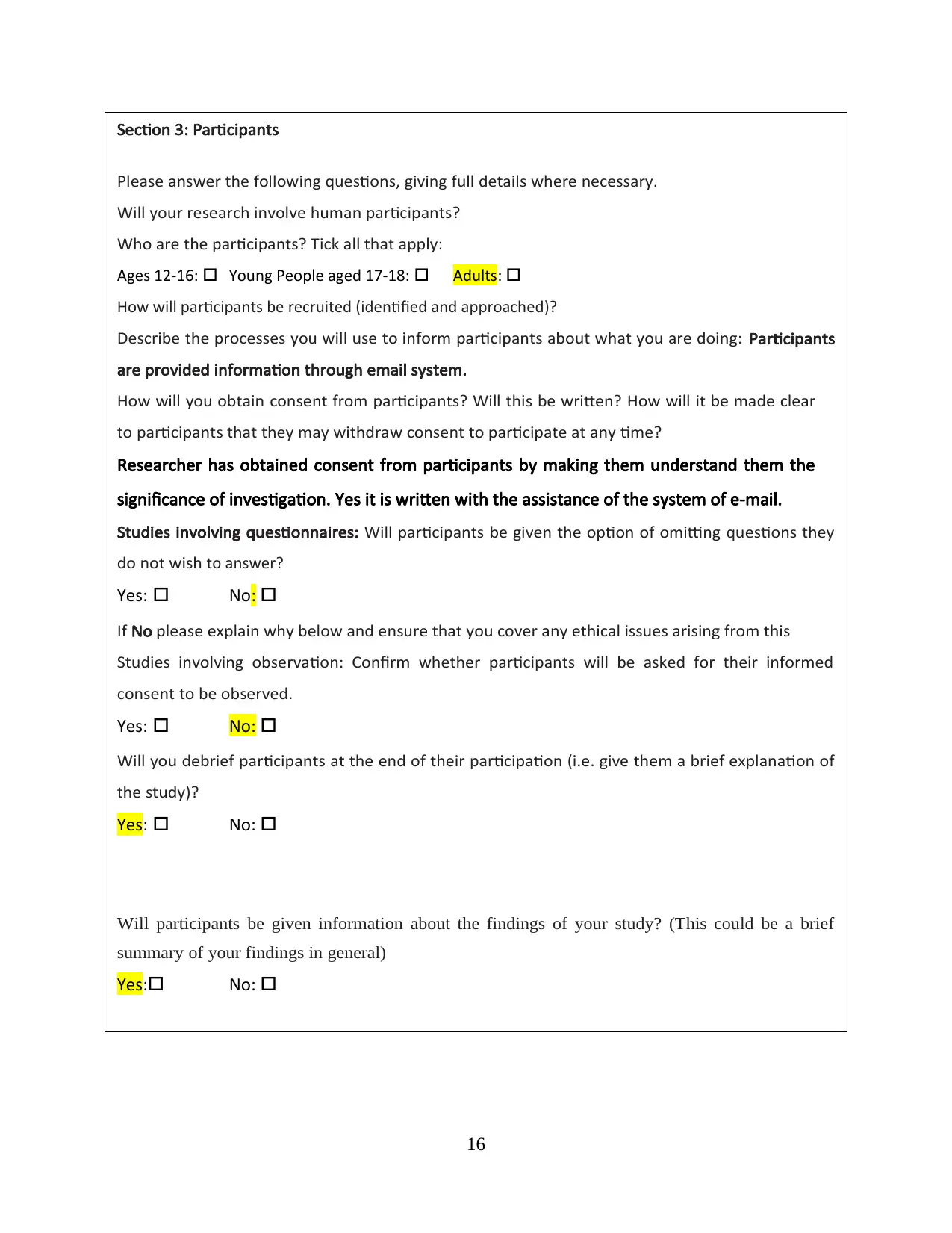
16
Section 3: Participants
Please answer the following questions, giving full details where necessary.
Will your research involve human participants?
Who are the participants? Tick all that apply:
Ages 12-16: Young People aged 17-18: Adults:
How will participants be recruited (identified and approached)?
Describe the processes you will use to inform participants about what you are doing: Participants
are provided information through email system.
How will you obtain consent from participants? Will this be written? How will it be made clear
to participants that they may withdraw consent to participate at any time?
Researcher has obtained consent from participants by making them understand them the
significance of investigation. Yes it is written with the assistance of the system of e-mail.
Studies involving questionnaires: Will participants be given the option of omitting questions they
do not wish to answer?
Yes: No:
If No please explain why below and ensure that you cover any ethical issues arising from this
Studies involving observation: Confirm whether participants will be asked for their informed
consent to be observed.
Yes: No:
Will you debrief participants at the end of their participation (i.e. give them a brief explanation of
the study)?
Yes: No:
Will participants be given information about the findings of your study? (This could be a brief
summary of your findings in general)
Yes: No:
Section 3: Participants
Please answer the following questions, giving full details where necessary.
Will your research involve human participants?
Who are the participants? Tick all that apply:
Ages 12-16: Young People aged 17-18: Adults:
How will participants be recruited (identified and approached)?
Describe the processes you will use to inform participants about what you are doing: Participants
are provided information through email system.
How will you obtain consent from participants? Will this be written? How will it be made clear
to participants that they may withdraw consent to participate at any time?
Researcher has obtained consent from participants by making them understand them the
significance of investigation. Yes it is written with the assistance of the system of e-mail.
Studies involving questionnaires: Will participants be given the option of omitting questions they
do not wish to answer?
Yes: No:
If No please explain why below and ensure that you cover any ethical issues arising from this
Studies involving observation: Confirm whether participants will be asked for their informed
consent to be observed.
Yes: No:
Will you debrief participants at the end of their participation (i.e. give them a brief explanation of
the study)?
Yes: No:
Will participants be given information about the findings of your study? (This could be a brief
summary of your findings in general)
Yes: No:
Paraphrase This Document
Need a fresh take? Get an instant paraphrase of this document with our AI Paraphraser
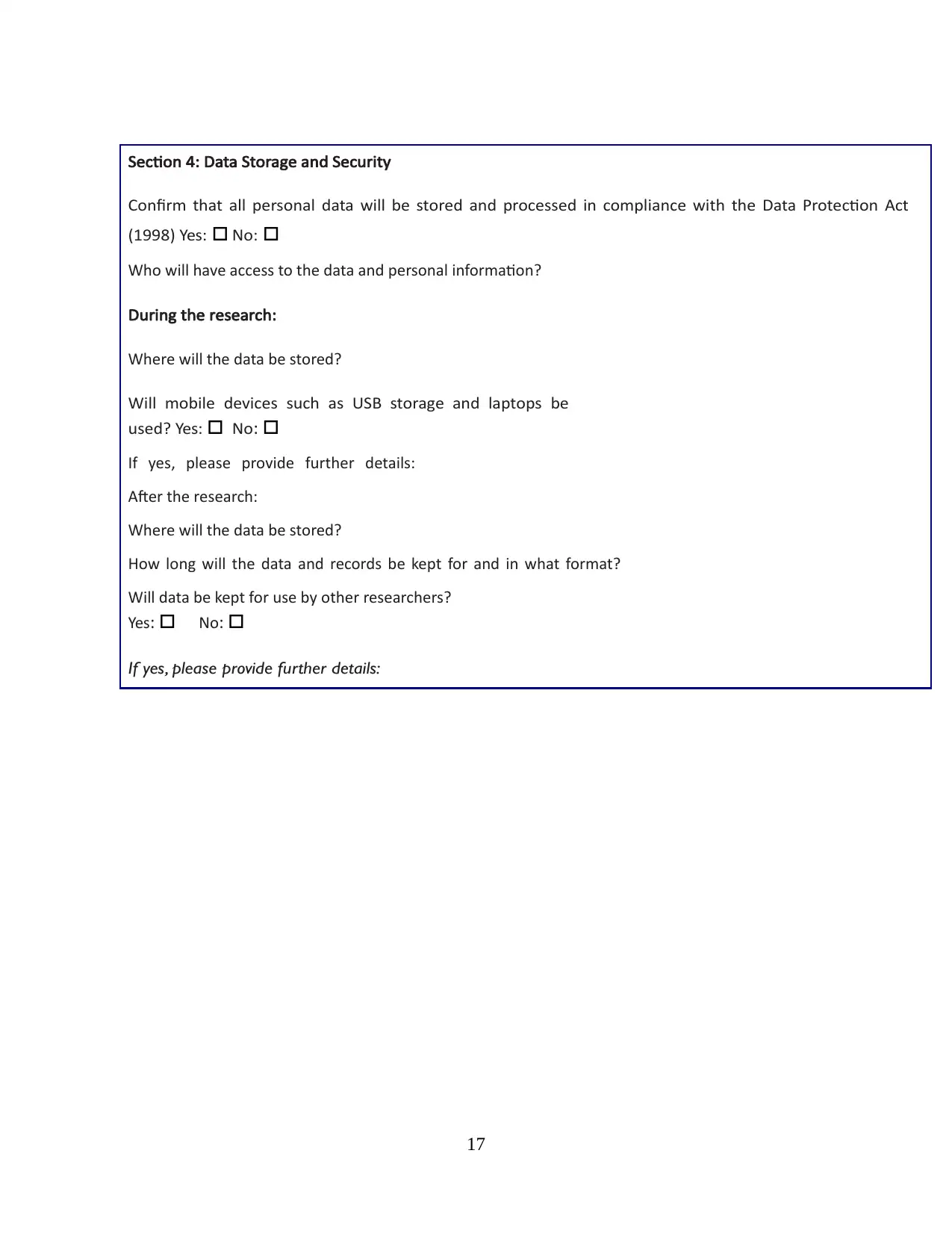
Section 4: Data Storage and Security
Confirm that all personal data will be stored and processed in compliance with the Data Protection Act
(1998) Yes: No:
Who will have access to the data and personal information?
During the research:
Where will the data be stored?
Will mobile devices such as USB storage and laptops be
used? Yes: No:
If yes, please provide further details:
After the research:
Where will the data be stored?
How long will the data and records be kept for and in what format?
Will data be kept for use by other researchers?
Yes: No:
If yes, please provide further details:
17
Confirm that all personal data will be stored and processed in compliance with the Data Protection Act
(1998) Yes: No:
Who will have access to the data and personal information?
During the research:
Where will the data be stored?
Will mobile devices such as USB storage and laptops be
used? Yes: No:
If yes, please provide further details:
After the research:
Where will the data be stored?
How long will the data and records be kept for and in what format?
Will data be kept for use by other researchers?
Yes: No:
If yes, please provide further details:
17
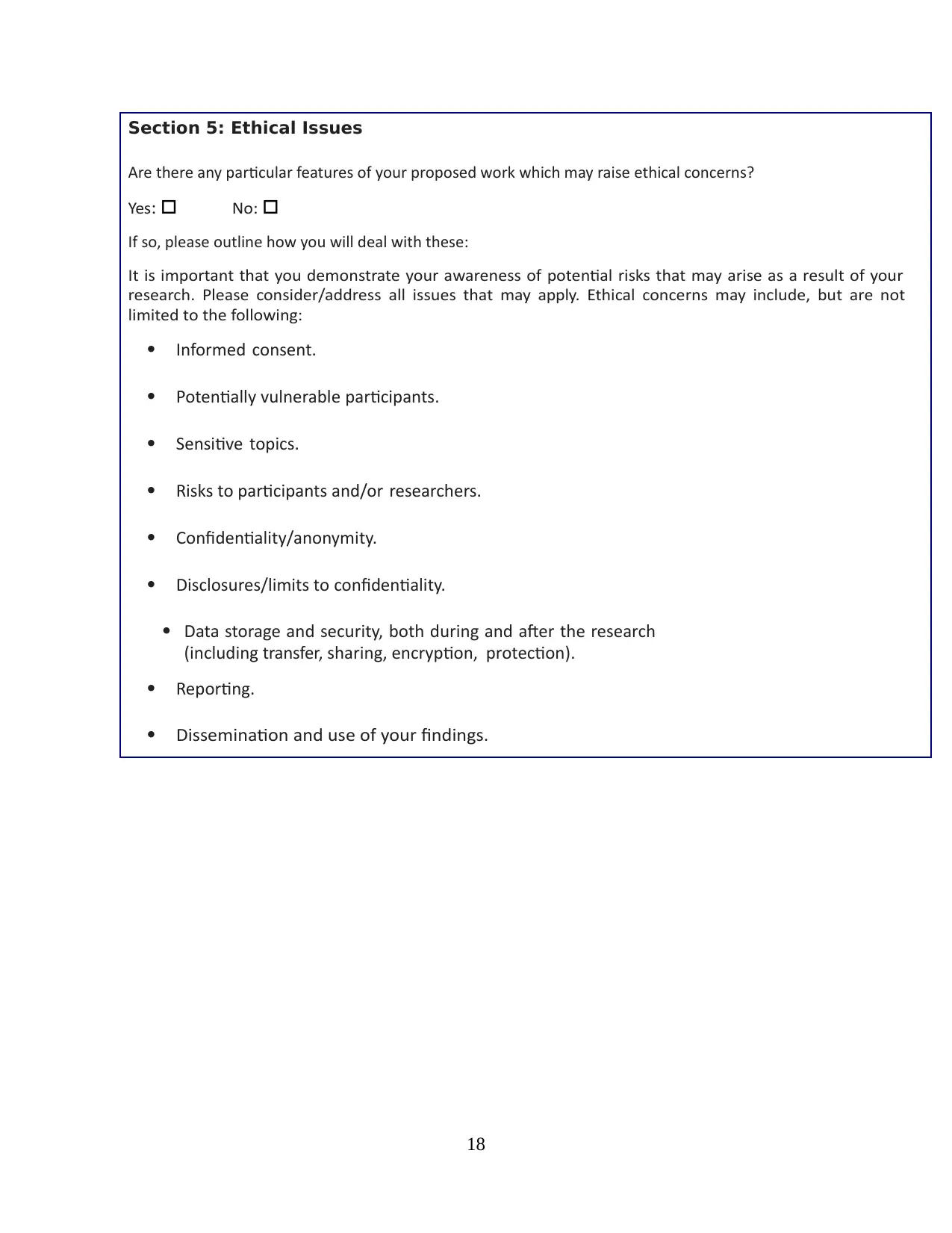
Section 5: Ethical Issues
Are there any particular features of your proposed work which may raise ethical concerns?
Yes: No:
If so, please outline how you will deal with these:
It is important that you demonstrate your awareness of potential risks that may arise as a result of your
research. Please consider/address all issues that may apply. Ethical concerns may include, but are not
limited to the following:
Informed consent.
Potentially vulnerable participants.
Sensitive topics.
Risks to participants and/or researchers.
Confidentiality/anonymity.
Disclosures/limits to confidentiality.
Data storage and security, both during and after the research
(including transfer, sharing, encryption, protection).
Reporting.
Dissemination and use of your findings.
18
Are there any particular features of your proposed work which may raise ethical concerns?
Yes: No:
If so, please outline how you will deal with these:
It is important that you demonstrate your awareness of potential risks that may arise as a result of your
research. Please consider/address all issues that may apply. Ethical concerns may include, but are not
limited to the following:
Informed consent.
Potentially vulnerable participants.
Sensitive topics.
Risks to participants and/or researchers.
Confidentiality/anonymity.
Disclosures/limits to confidentiality.
Data storage and security, both during and after the research
(including transfer, sharing, encryption, protection).
Reporting.
Dissemination and use of your findings.
18
You're viewing a preview
Unlock full access by subscribing today!
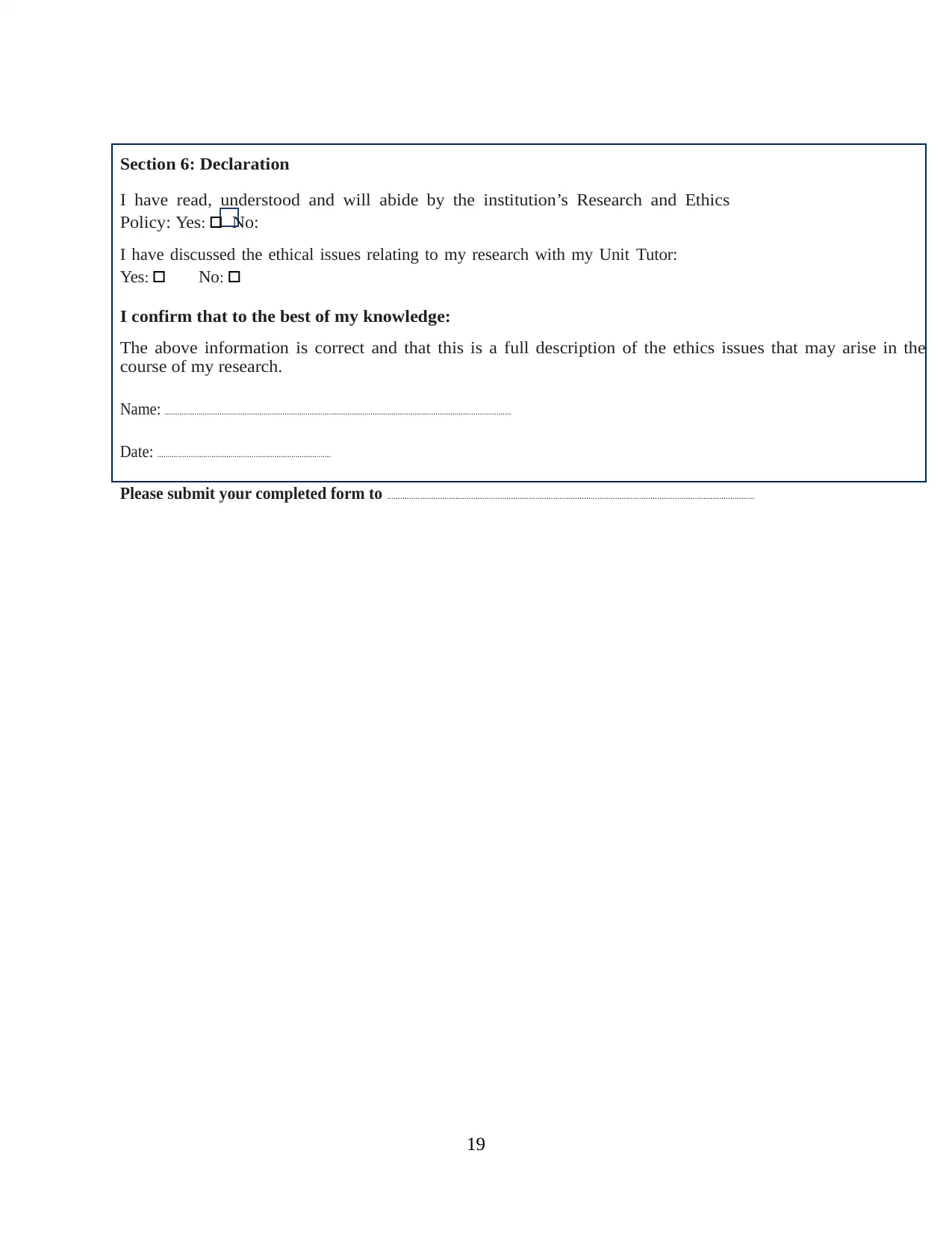
19
Section 6: Declaration
I have read, understood and will abide by the institution’s Research and Ethics
Policy: Yes: No:
I have discussed the ethical issues relating to my research with my Unit Tutor:
Yes: No:
I confirm that to the best of my knowledge:
The above information is correct and that this is a full description of the ethics issues that may arise in the
course of my research.
Name: .....................................................................................................................................................................
Date: ...................................................................................
Please submit your completed form to ......................................................................................................................................................................
Section 6: Declaration
I have read, understood and will abide by the institution’s Research and Ethics
Policy: Yes: No:
I have discussed the ethical issues relating to my research with my Unit Tutor:
Yes: No:
I confirm that to the best of my knowledge:
The above information is correct and that this is a full description of the ethics issues that may arise in the
course of my research.
Name: .....................................................................................................................................................................
Date: ...................................................................................
Please submit your completed form to ......................................................................................................................................................................
Paraphrase This Document
Need a fresh take? Get an instant paraphrase of this document with our AI Paraphraser
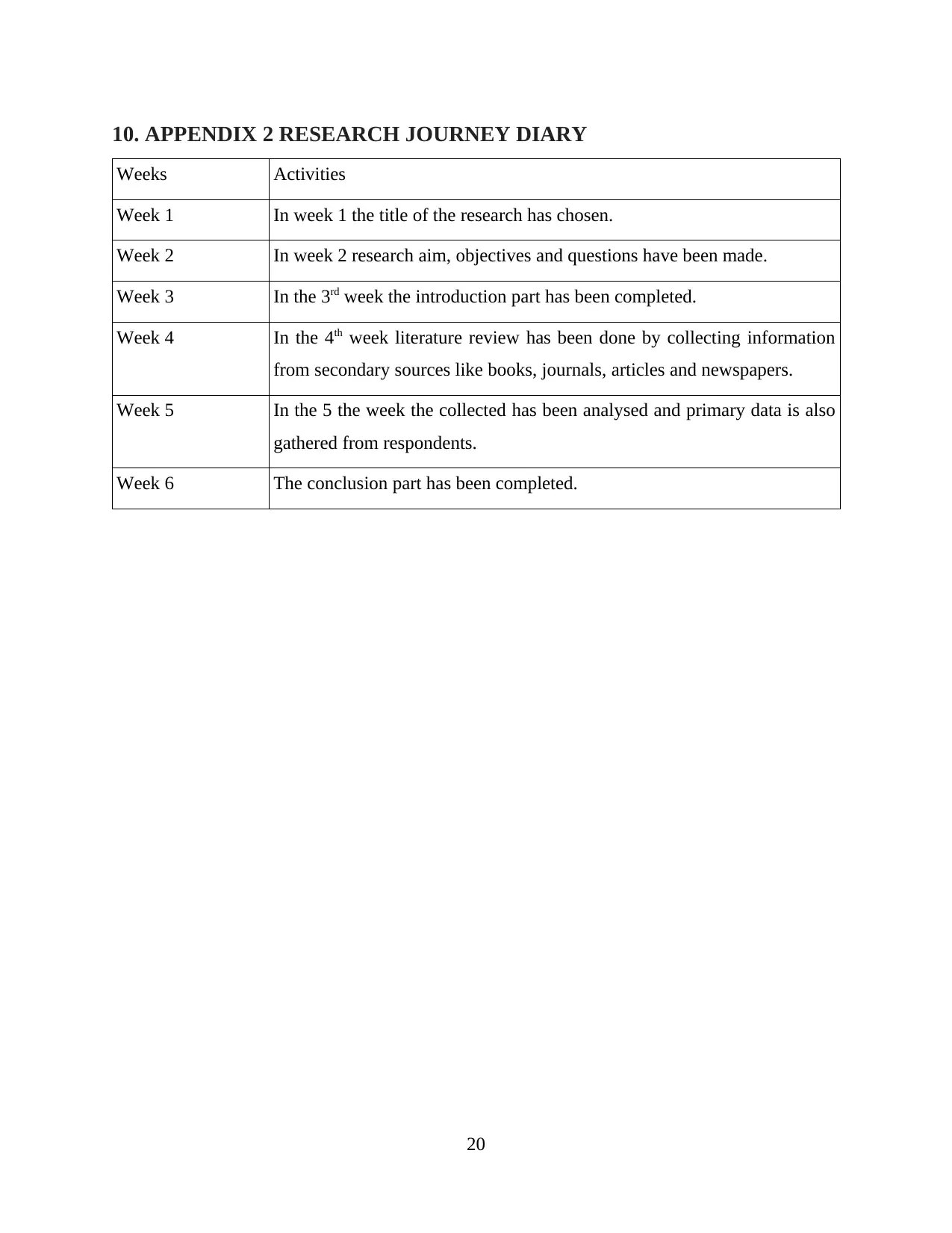
10. APPENDIX 2 RESEARCH JOURNEY DIARY
Weeks Activities
Week 1 In week 1 the title of the research has chosen.
Week 2 In week 2 research aim, objectives and questions have been made.
Week 3 In the 3rd week the introduction part has been completed.
Week 4 In the 4th week literature review has been done by collecting information
from secondary sources like books, journals, articles and newspapers.
Week 5 In the 5 the week the collected has been analysed and primary data is also
gathered from respondents.
Week 6 The conclusion part has been completed.
20
Weeks Activities
Week 1 In week 1 the title of the research has chosen.
Week 2 In week 2 research aim, objectives and questions have been made.
Week 3 In the 3rd week the introduction part has been completed.
Week 4 In the 4th week literature review has been done by collecting information
from secondary sources like books, journals, articles and newspapers.
Week 5 In the 5 the week the collected has been analysed and primary data is also
gathered from respondents.
Week 6 The conclusion part has been completed.
20
1 out of 20
Related Documents
Your All-in-One AI-Powered Toolkit for Academic Success.
+13062052269
info@desklib.com
Available 24*7 on WhatsApp / Email
![[object Object]](/_next/static/media/star-bottom.7253800d.svg)
Unlock your academic potential
© 2024 | Zucol Services PVT LTD | All rights reserved.




